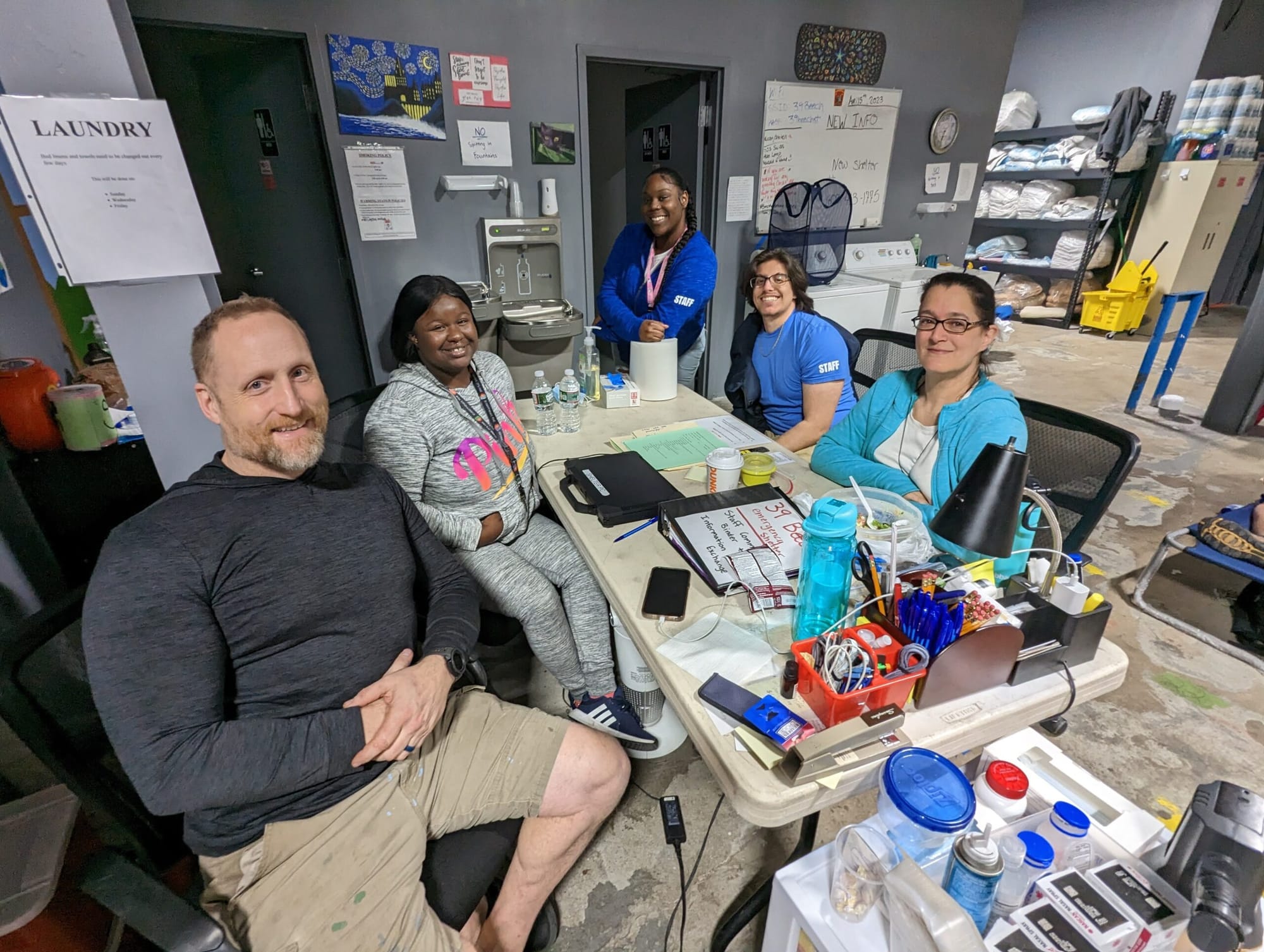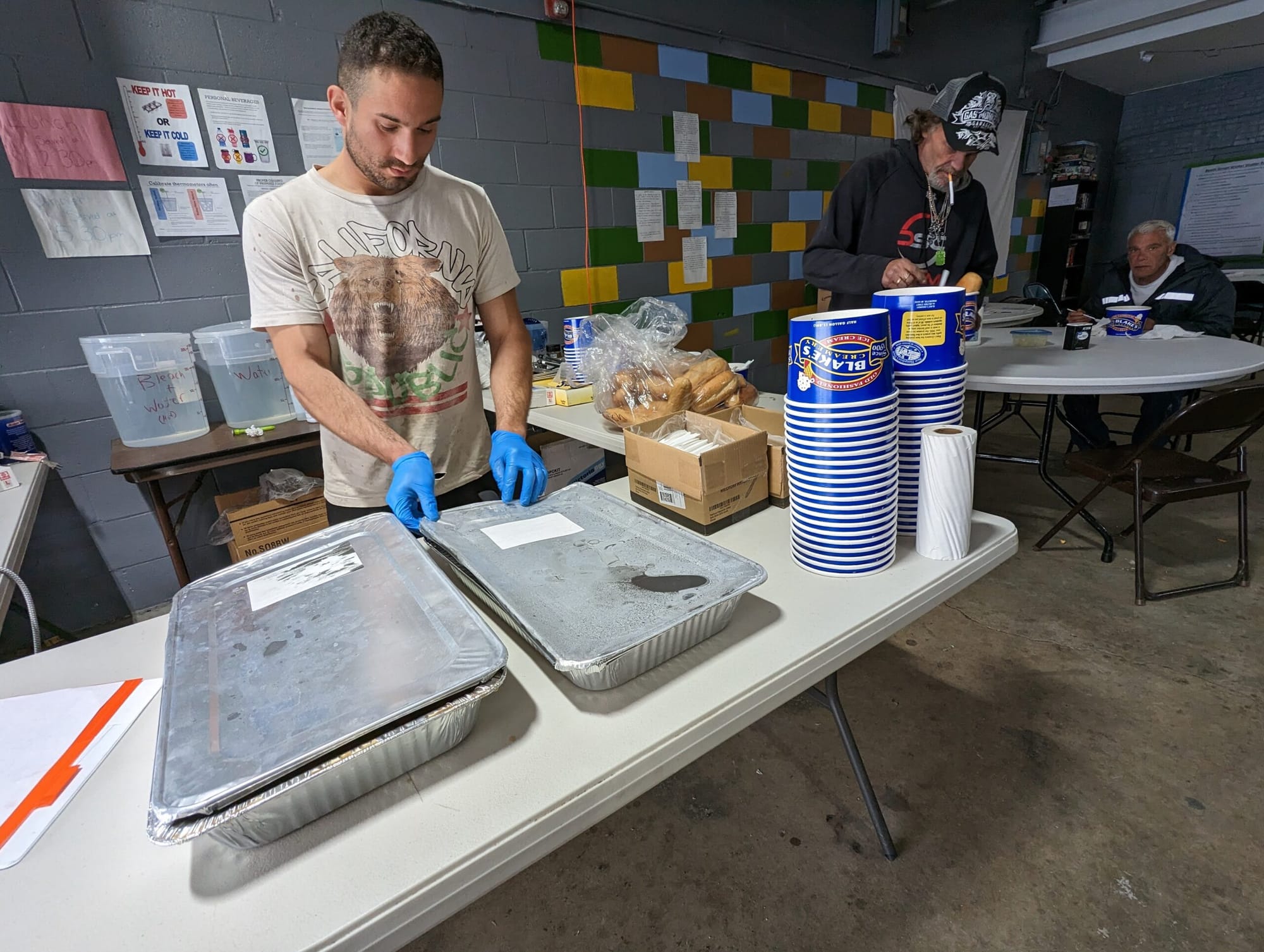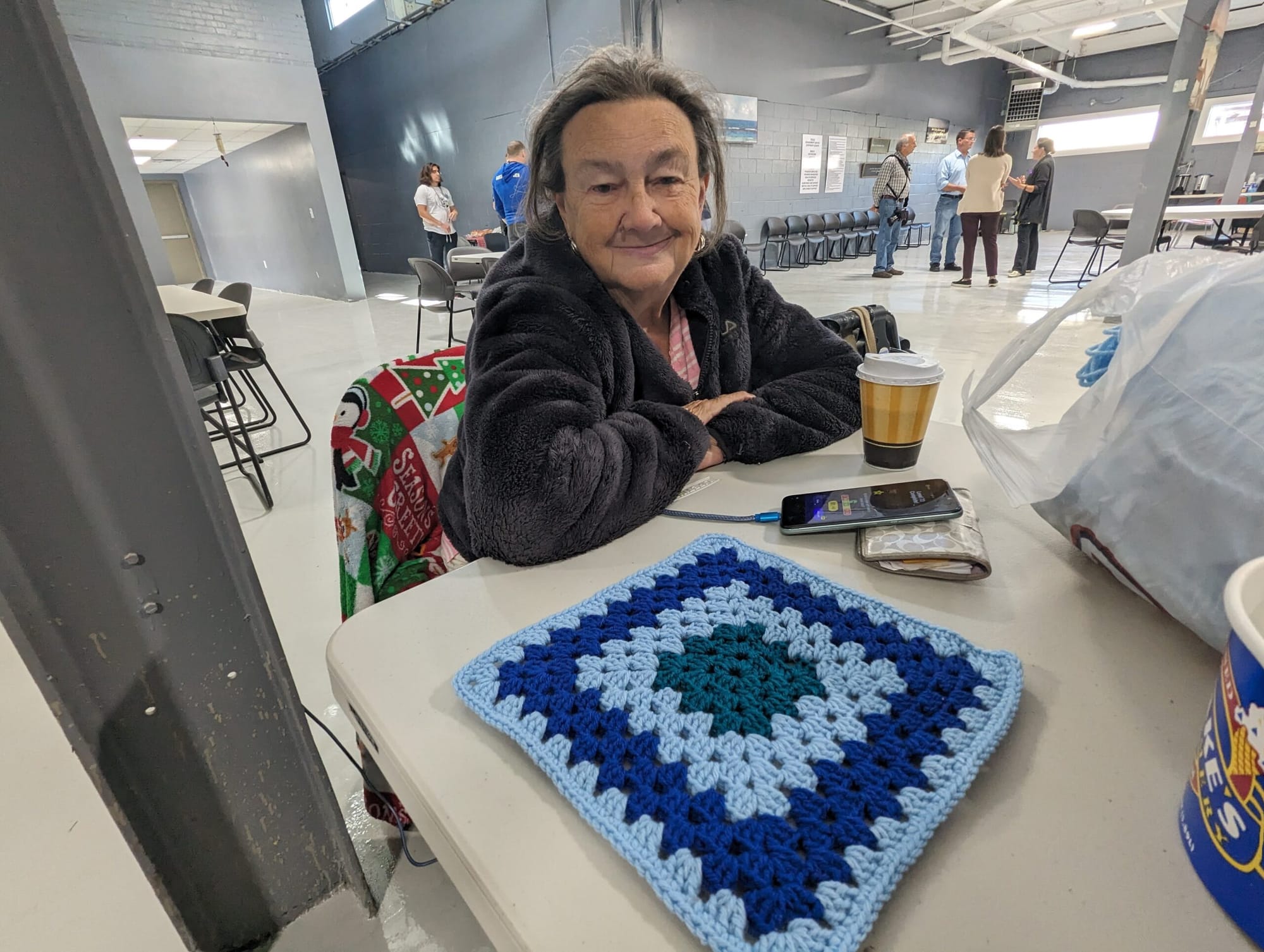Beech Street shelter and engagement center helping to fill housing and services void
It’s anticipated that tonight’s presentation by Director of Housing Stability Adrienne Beloin during the Nov. 21 Board of Aldermen meeting will show that the pathway is slow-going and filled with all sorts of tangible challenges. The board earlier this year approved maintaining the shelter through J

VIDEO above: A few of the residents of the Beech Street shelter who have been there since the beginning, and updates on where they are now.
MANCHESTER, NH – Much has changed since my first visit to the Manchester emergency shelter back in February, my second visit in April, my third visit in September and my most recent visit in November.
The shelter side now consists of sturdy bunk beds and the space has been retrofitted with doors and office space providing a sense of more privacy and organization. Services at 39 Beech St. have been expanded to include an “engagement center,” open to anyone in need of basic services – from showers and charging stations to medical care and a pathway to permanent housing.
It’s anticipated that tonight’s presentation by Director of Housing Stability Adrienne Beloin during the Nov. 21 Board of Aldermen meeting will show that the pathway is slow-going and filled with all sorts of tangible challenges. The board earlier this year approved maintaining the shelter through June of 2024 with funding for the engagement center to come from the initial $1.14 million Fiscal Year 2023 money allocated to the shelter.
Beloin is expected to bring forth some data which will include the number of people who have been able to move out of the shelter and into a more stable living situation. One of the goals of the engagement center is having the ability to connect the sign-in station to the statewide Homeless Management Information System, which would help the city gauge progress on getting people out of homelessness and assist in grant funding requests.
Progress measured by the numbers may not satisfy those members of the board of aldermen who have over these months pressed Beloin for a census that shows movement, as the availability of transitional and permanent affordable housing units remain scarce.

Designed to be a “low barrier” shelter, meaning there are few restrictions to prevent people from coming there, Beech Street still has a set of rules and provides a form that must be signed upon entry (see below). There is also a grievance process for anyone who feels they have been turned away unfairly.
Beloin said when the center opened in September one major concern was the city’s escalating crisis of homelessness – particularly the “unsheltered unhoused” population. The engagement center was modeled after other such daytime centers that act as a hub of services as well as a bridge for those seeking more permanent housing; a touchpoint to get people connected who might otherwise not be accounted for.

Opening the shelter and engagement center meant hiring a manager. Manchester Fire Chief Ryan Cashin, who at that time had oversight of the project prior to the city establishing the Department of Housing Stability under Beloin’s leadership, hired Jake King, who about a decade ago ran a day center for the city on Central Street.
Cashin had gotten to know King, a former Army Ranger and Londonderry police officer, during the evacuation of the Firestone encampment back in 2021. King’s business, Thrive Outdoors, was an abutter of the encampment and so he became reconnected to the issue of homelessness through that experience. As shelter manager, King has expanded his post-COVID business model from team building and leadership training to include operations management under the entity of East Coast Evolution Leadership. King is responsible for staffing the shelter and engagement center.

As Beloin pointed out, the staff comes with a variety of skills but budgetarily, there is no provision for on-site case workers. The shelter instead works collaboratively with outside agencies who come to the engagement center on a regular rotating basis.
Another aspect of the engagment center is that every person who comes through is entered into a database so that the city can begin to understand who the people are who are in need of services, what services they are most in need of, which of those services are being met and which services need to be developed or expanded upon.
When I returned to the shelter the first week of November, I got to reconnect again with two of the three residents I met back in April who were there from the beginning and still there in September – Chris Parker, 66, and Stella Hutson, 74. They are representative of several of those who are currently residing at 39 Beech St. – dealing with health and mobility issues as well as other barriers to independent living. They are both featured in the video at the top of this story.
When I saw Stella again she was sitting at a table with other residents and socializing. She didn’t seem to remember me from our previous two interviews, but her cataracts distort her vision. Her main comment was “I’m still here,” and that she is still hoping to find a home where she can live independently. So far she and another woman whom I met in the spring, Debbie, said they have had a few interviews for housing but their applications were rejected – that is up to the discretion of landlords whether to accept someone. Debbie suspected it was a past eviction that was preventing her from getting a new place, although she also has other issues still in need of sorting through. Stella said she wasn’t sure why she was still waiting.


Chris Parker declined to talk with me this time around. The previous two times he was animated and seemed to be full of energy. He and Stella were sitting together, and Stella was in the process of crocheting him a blanket. This time he sat at a table alone with his head down on a pile of blankets. He appeared to be tired and moved slowly using a walker as he made his way down a ramp to go outside for a cigarette. He only would add that he was hopeful a new situation would be found for him and that he was grateful to have a safe place to live.
Below is a rundown of some of the progress and remaining hurdles the shelter and engagement center are facing as outlined by Beloin.
Food
In February the emergency shelter was a large room filled with temporary cots. Food was being provided by the NH Food Bank and others who donated meals. In June that arrangement was no longer viable and so, for a time, the 1269 Cafe worked with the shelter staff to warm up meals that could be transported between the two outposts.
However, without its own kitchen, providing meals for 40 people daily became a challenge.
Since expanding to include the engagement center there is a coffee station and a plastic container where donated bagels and other baked goods are available. There are a few used refrigerators that have been placed in the engagement center where people can put personal food items. Many of those who stay at the shelter will go out to buy food items at nearby markets or the dollar store and bring them back to share with others, particularly those who have mobility issues.
Beloin has been seeking an entity to sponsor provisions and has finally found a local church with a commercial kitchen that is willing to help with food prep and transportation. A stainless steel cart has been obtained and will be used to keep food warm. This was all in the works as of the first week of November and expected to be operational before the end of the month.
Other aspects of the engagement center are in various stages of development, including:
- Office spaces – for community providers and case management services. There are three offices that have been retrofitted into the shelter side of the building which are monitored for safety by staff. One has a phone line in it for anyone who needs to make a phone call. All outside providers are able to use the office spaces for privacy but many prefer to make the rounds in the open space if the engagement center. There is access to WiFi and wireless printing/copying for whatever is needed as a satellite office while on site.
- Peer support – Several of the agency and shelter staff members have lived experience of both homelessness and/or recovery and as interest arises the goal is to initiate peer support groups on site.
- Housing navigation – These services are currently being provided by the VA, The Mental Health Center of Greater Manchester, and The Manchester Housing and Redevelopment Authority
- Mental health services – The Mental Health Center of Greater Manchester has an outreach team that visits the center and does community outreach as well.
- Substance programs – Providers include: Live Free Recovery, Gatehouse, Better Life Partners, Overdose Prevention from the City Health Department; Harm Reduction Coalition (no needle exchange on site), and Health Care for the Homeless
- Employment resources – NH Job Corps is involved so far. Beloin says she is actively seeking resource connections with other workforce development providers who can come to the site.
- Healthcare – Outdoor space is available for mobile clinic vans from Health Care for the Homeless. Workers also come inside to treat or evaluate anyone with medical needs.
Items always needed and welcome as donations:
- Socks
- Sweatpants
- T-shirts
- Underwear
- Bras
- Clothing
- Footwear
- Winter wear
- backpacks
- Feminine hygiene
- Toothbrushes
- Toothpaste
- Shampoo
- Conditioner
- Deodorant
- Band-aids
- Razors
- Lotion
- Hair products
- Hand sanitizer
- Trash bags
- Wallets
- Toilet paper
- Paper towels
- Hand soap
- Paper plates
- Plastic utensils
- To-go cups
- Coffee
- Sugar and sweetener Creamer
- Hand warmers
- Toe warmers
- Journals/planners





